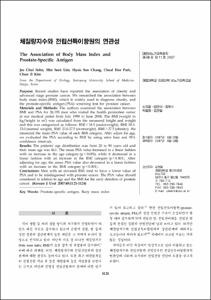체질량지수와 전립선특이항원의 연관성
- Keimyung Author(s)
- Chang, Hyuk Soo; Park, Choal Hee; Kim, Chun Il
- Department
- Dept. of Urology (비뇨의학)
- Journal Title
- Korean Journal of Urology
- Issued Date
- 2007
- Volume
- 48
- Issue
- 11
- Keyword
- Prostate-specific antigen; Body mass index
- Abstract
- Purpose: Recent studies have reported the association of obesity and advanced stage prostate cancer. We researched the association between
body mass index (BMI), which is widely used to diagnose obesity, and the prostate-specific antigen (PSA) screening test for prostate cancer.
Meterials and Methods: The authors examined the association between BMI and PSA for 26,193 men who visited the health promotion center
at our medical center from July 1998 to June 2004. The BMI (weight in kg/height in m2) was calculated from the measured height and weight
and this was categorized as follows: BMI<18.5 (underweight), BMI 18.5- 23.0 (normal weight), BMI 23.0-27.5 (overweight), BMI>27.5 (obesity). We measured the mean PSA value of each BMI category. After adjust for age, we evaluated the PSA according to BMI by using error bars and 95% confidence intervals. Results: The patients' age distribution was from 20 to 90 years old and their mean age was 46.1. The mean PSA value increased in a linear fashion with an increase in the age category (p<0.001), while it decreased in a linear fashion with an increase in the BMI category (p<0.001). After adjusting for age, the mean PSA value also decreased in a linear fashion with an increase in the BMI category (p<0.001). Conclusions: Men with an elevated BMI tend to have a lower value of PSA and to be misdiagnosed with prostate cancer. The PSA value should considered in relation to age and the BMI for the early detection of prostate cancer.
- Alternative Title
- The Association of Body Mass Index and Prostate-Specific Antigen
- Publisher
- School of Medicine
- Citation
- 손지철 et al. (2007). 체질량지수와 전립선특이항원의 연관성. Korean Journal of Urology, 48(11), 1121–1124. doi: 10.4111/kju.2007.48.11.1121
- Type
- Article
- ISSN
- 0494-4747
- Appears in Collections:
- 1. School of Medicine (의과대학) > Dept. of Urology (비뇨의학)
- 파일 목록
-
-
Download
 oak-aaa-03620.pdf
기타 데이터 / 339.76 kB / Adobe PDF
oak-aaa-03620.pdf
기타 데이터 / 339.76 kB / Adobe PDF
-
Items in Repository are protected by copyright, with all rights reserved, unless otherwise indicated.